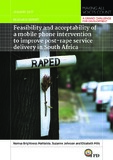Feasibility and acceptability of a mobile phone intervention to improve post-rape service delivery in South Africa
| dc.contributor.author | Mahlalela, Nomsa Brightness | |
| dc.contributor.author | Johnson, Suzanne | |
| dc.contributor.author | Mills, Elizabeth | |
| dc.date.accessioned | 2017-01-30T15:28:28Z | |
| dc.date.available | 2017-01-30T15:28:28Z | |
| dc.date.issued | 2017-01 | |
| dc.identifier.citation | Mahlalela, N.B., Johnson, S. and Mills, E. (2017) Feasibility and acceptability of a mobile phone intervention to improve post-rape service delivery in South Africa, Making All Voices Count Research Report, Brighton: Institute of Development Studies | en |
| dc.identifier.uri | https://opendocs.ids.ac.uk/opendocs/handle/20.500.12413/12771 | |
| dc.description.abstract | Mobile health (mHealth) interventions – in which mobile phones are used to advance positive health outcomes – have only recently been applied to addressing broader questions of health governance. This report discusses research on a mobile phone app that was designed to create a coordinated platform through which rape victims could express their views on the quality of services and support offered by police and health-care workers in South Africa, in order to promote greater accountability between service providers and clients.The study, which assessed the feasibility and acceptability of the proposed app, comprised qualitative and quantitative research with rape victims and caregivers accessing follow-up services at four rape care centres in Tshwane district, Pretoria. Of 140 participants enrolled in the study (108 rape victims and 32 caregivers), 86.4% reported owning a mobile phone. However, the results also revealed that mobile phone theft during sexual assault was common, with 34 out of 63 participants (55%) who did not bring their mobile phones to their first visit to the facility reporting that their phone had been stolen during the assault. Nonetheless, the findings confirmed the feasibility of the app, which was subsequently developed and piloted. In addition, high levels of interest in using mobile phones to provide feedback on the quality of service delivery (95%) showed the potential value of such an intervention for improved communication between service users and providers. | en |
| dc.description.sponsorship | DFID | en |
| dc.description.sponsorship | USAID | en |
| dc.description.sponsorship | Omidyar Network | en |
| dc.description.sponsorship | SIDA | en |
| dc.language.iso | en | en |
| dc.publisher | Institute of Development Studies | en |
| dc.relation.ispartofseries | Making All Voices Count Research Reports; | |
| dc.rights | this work is distributed under the terms of the Creative Commons Attribution 4.0 International licence, which permits unrestricted use, distribution and reproduction in any medium, provided the original authors and source are credited. http://creativecommons.org/licenses/ by/4.0/legalcode | en |
| dc.rights.uri | http://creativecommons.org/licenses/by/4.0/ | en |
| dc.subject | Governance | en |
| dc.subject | Health | en |
| dc.subject | Participation | en |
| dc.subject | Politics and Power | en |
| dc.title | Feasibility and acceptability of a mobile phone intervention to improve post-rape service delivery in South Africa | en |
| dc.type | Series paper (non-IDS) | en |
| dc.rights.holder | © The Institute of Development Studies 2017 | en |
| rioxxterms.funder | Default funder | en |
| rioxxterms.identifier.project | Default project | en |
| rioxxterms.version | NA | en |
| rioxxterms.funder.project | c941507f-fd0b-4fc3-9822-4b2132f61a1d | en |
Files in this item
This item appears in the following Collection(s)
-
Making All Voices Count [134]
Except where otherwise noted, this item's license is described as this work is distributed under the terms of the Creative Commons Attribution 4.0
International licence, which permits unrestricted use, distribution and reproduction in any
medium, provided the original authors and source are credited. http://creativecommons.org/licenses/
by/4.0/legalcode


